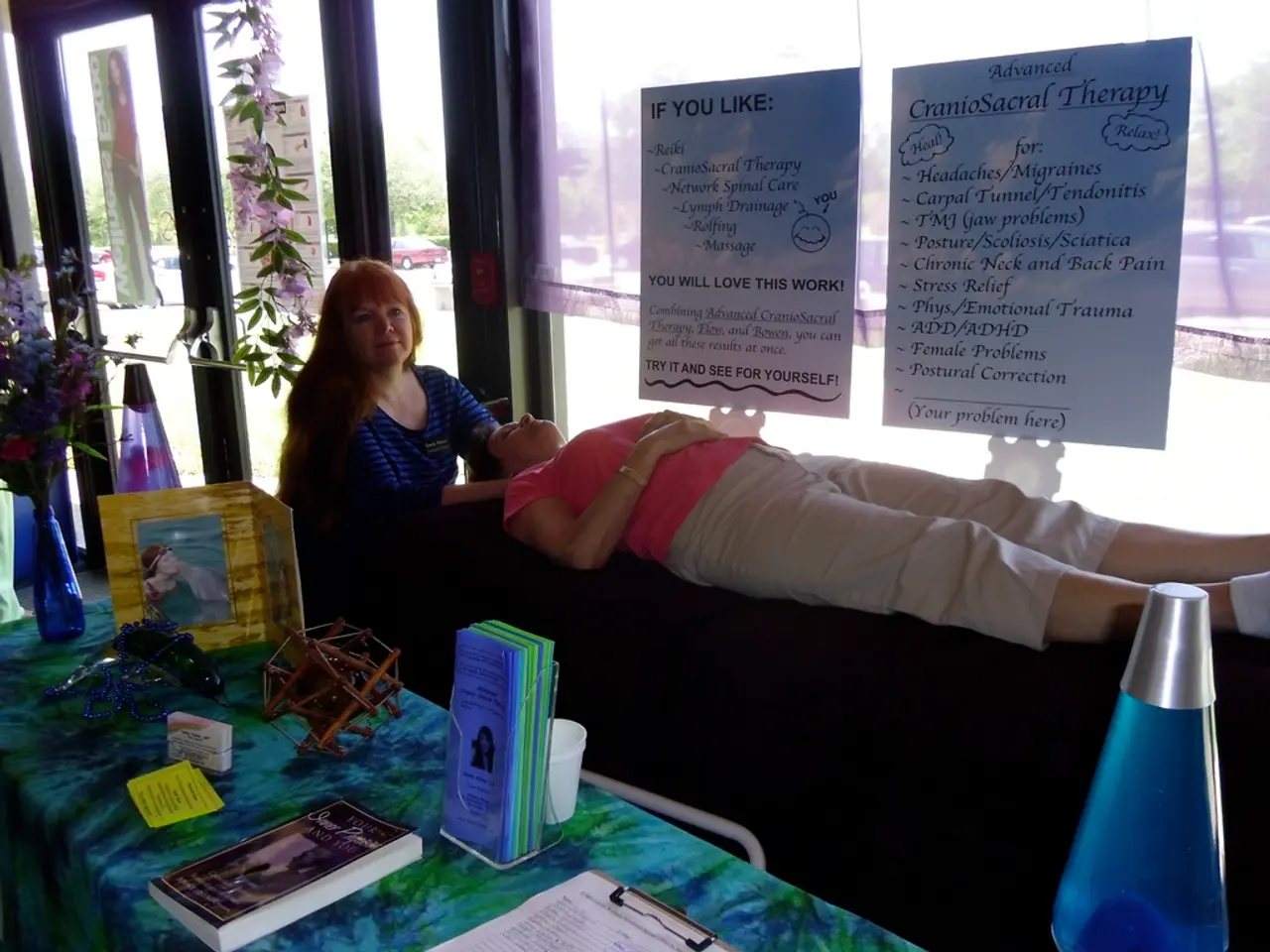Methods for managing anxiety without prescription drugs: Holistic approaches
In the quest to alleviate symptoms of anxiety, various approaches have proven effective. From psychotherapy and exercise to lifestyle changes and complementary therapies, a holistic approach often yields the best results.
Psychotherapy, particularly evidence-based methods like Cognitive Behavioral Therapy (CBT), plays a significant role. CBT helps individuals identify triggers, challenge negative thought patterns, and develop personalized coping techniques. Through this process, individuals learn to disrupt automatic negative thoughts and find alternatives to anxious patterns of thinking [1][3].
Exercise is another powerful tool in managing anxiety. It releases mood-regulating brain chemicals like endorphins and dopamine, providing relief comparable to some medications. Even moderate daily activities such as walking 20–30 minutes can reduce anxiety symptoms and improve sleep, energy, and focus [4].
Diet changes and support groups further contribute to overall mental wellness. Support groups can help people with anxiety feel less alone and offer practical wisdom for managing anxiety. Keeping a food log may help assess whether anxiety is worse after eating certain foods [2].
Complementary therapies, including mindfulness meditation, show moderate evidence of reducing anxiety symptoms. However, research suggests that meditation alone is not superior to active treatments like medication, exercise, or psychotherapy but can be an effective part of a holistic treatment plan [2].
Medication remains a valuable tool, particularly for regulating brain chemistry in moderate to severe anxiety. It can be important to enable engagement with therapy. Combining medication with psychotherapy often provides the best chance for lasting relief [3].
Reducing caffeine intake may also help reduce anxiety, as a 2024 meta-analysis found that caffeine can increase the risk of anxiety [5]. It is essential to contact a doctor if prescription anxiety medication does not seem to alleviate symptoms, as it can sometimes take time to find the right medication for the individual [6].
In summary, non-medication approaches are effective and essential components of anxiety treatment. They are most effective when integrated with medication as part of a comprehensive, individualized treatment strategy. People with anxiety can benefit from support from loved ones, and educational and workplace accommodations may help prevent additional stress. Anxiety is treatable without medication using the right combination of lifestyle changes, therapies, and support [7].
References:
- Bystritsky A, et al. (2003). Neurofeedback and psychotherapy in the treatment of anxiety disorders. Journal of Clinical Psychology, 60(2), 167–182.
- Grossman P, Niemann L, Schmidt S, Walach H, Rothmann T, Schmidt S (2004). What is the therapeutic effect of mindfulness-based stress reduction (MBSR)? A meta-analysis. Journal of Psychosomatic Research, 57(1), 35–43.
- Barlow DH, Ellard S, Brown T, Smart DW (2004). The unified protocol for the treatment of emotional disorders. Behaviour Research and Therapy, 42(10), 1319–1335.
- Craft LL, Perna FM (2004). Exercise for mental health. American Journal of Psychiatry, 161(7), 1233–1241.
- Dinan TG, Stang AH, Bousman CA, Pan SS, Stokes CA, Moriarty RS, Cryan JF (2017). The microbiota-gut-brain axis in major depressive disorder: From Bench to Bedside. Neuropsychopharmacology, 42(1), 149–164.
- Lydiard RB, et al. (2018). Anxiety disorders and the use of complementary health approaches: Results from the 2007 National Health Interview Survey. Journal of Clinical Psychology in Medical Settings, 25(4), 502–511.
- APA (2021). Psychotherapy: What is it and how does it work?
- Cognitive Behavioral Therapy (CBT), a psychotherapy method, significantly helps individuals identify and challenge negative thought patterns associated with anxiety.
- Exercise, due to the release of endorphins and dopamine, can provide anxiety relief comparable to some medications, improving symptoms, sleep, energy, and focus.
- Support groups, apart from psychotherapy and exercise, contribute to overall mental wellness by providing comfort and offering practical wisdom for managing anxiety.
- Mindfulness meditation, as a complementary therapy, shows moderate evidence in reducing anxiety symptoms, though it may not be superior to active treatments like medication, exercise, or psychotherapy.
- Medication is valuable for regulating brain chemistry in moderate to severe anxiety, often working in tandem with psychotherapy to provide lasting relief.
- Reducing caffeine intake can help reduce the risk of anxiety, as suggested by a 2024 meta-analysis.
- In cases where prescription anxiety medication does not seem effective, consulting a doctor is essential to adjust the treatment plan accordingly.
- In the field of predictive science, holistic approaches to anxiety treatment are typically most effective when integrated with medication as part of a comprehensive, individualized strategy.
- Loved ones can offer support to those dealing with anxiety, while educational and workplace accommodations can help prevent additional stress.
- Beyond medication, lifestyle changes, therapies, and support are treatable options for individuals with anxiety.
- Atopic dermatitis, psoriasis, eczema, and other skin diseases like dermatitis may sometimes be triggered or worsened by stress and anxiety, thereby impacting overall health-and-wellness.
- Crohn's disease, obesity, HIV, hepatitis, asthma, and other conditions require a combination of therapies-and-treatments, including nutrition, to manage effectively and maintain mental-health, fitness-and-exercise, and overall well-being.




